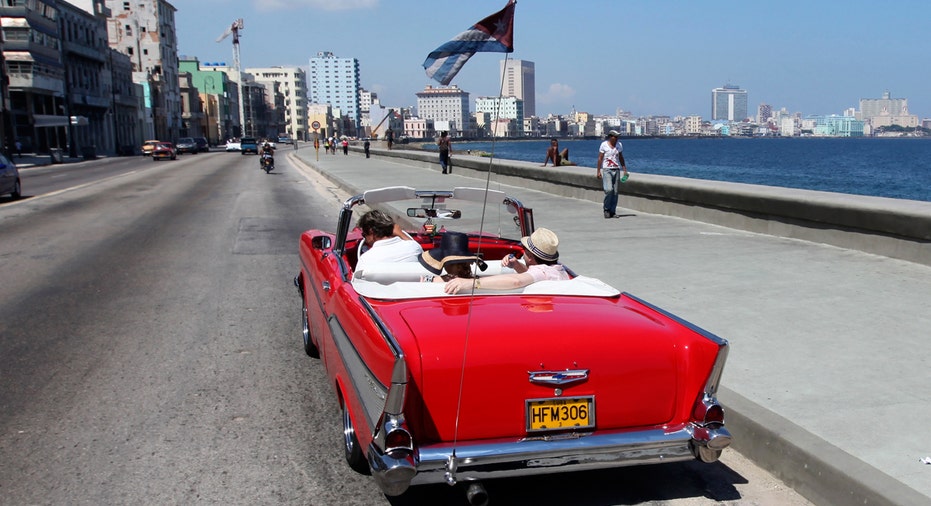Now on Flipboard: Can Cuba be U.S.A. 2.0?

If you exclude nearly 60 years of sanctions and a rebel communist leader, the U.S. and Cuba have quite a bit in common including their love of baseball. New York Met Yoenis Cespedes, who defected from Cuba in 2011, is now fielding for the team at Citi Field in the playoffs, the first for the Mets since 2006.
Just 90 miles south of Florida, with year-round sun and sandy beaches, it could easily be the next hot tourist mecca. One that could help revive the once vibrant casino industry that captivated movie goers in Francis Ford Coppola’s Godfather II, the American Mafia epic.
Frozen in time since 1959 after Fidel Castro led his rebel army to victory, change is finally afoot in Cuba. As the Obama Administration and Cuban President Raul Castro established diplomatic relations this summer, it appears the island is on the cusp of an economic evolution albeit a slow one.
FOXBusiness.com decided the time was right to report a series of deep dive stories into the most interesting trends that will likely shape the economic future of Cuba and perhaps the U.S. including the island’s cornerstones; tourism and the lucrative cigar trade. Flipboard is featuring our coverage of Cuba and you can read all the articles here.
The U.S. tourism industry is laying the ground work for when U.S. travelers can visit the island without restrictions hoping to tap what could eventually be a $6 billion industry. JetBlue (NASDAQ:JBLU) offers non-stop service to Havana provided it meets U.S. Treasury Department criteria such as a humanitarian or educational mission. Carnival (NYSE:CCL), the world’s largest cruise operator, will offer passage to the island starting in May of 2016. Details are still being hammered out with Cuban officials. And Major League Baseball Commissioner Rob Manfred says he’d be open to exhibition games as early as the spring of 2016, according to a July interview in the All-Star Game program. Credit card issuer Mastercard (NYSE:MA), also the MLB’s official sponsor, lifted a block on Cuba transactions earlier this year. While rival Visa (NYSE:V) has plans to enter Cuba but has disclosed few details.
Along with baseball and tourism, the island is chock full of natural resources such as oil, gas and nickel, valuable commodities to almost any global nation. Cuba is believed to have vast amounts of undiscovered oil and natural gas as surveyed by the U.S. Geological Survey. These finds could mirror the success U.S. energy companies have achieved in the Gulf of Mexico, according to energy executives. Cuba, recognizing the appeal, is seeking about $8 billion in foreign investment according to Cuba’s Ministry of Foreign Trade as reported by the USGS.
However the hope for a speedy Cuban renaissance may be dashed in the short-term. First, the global economy is amidst a slowdown in part tied to the massive unwinding of commodity prices. Per barrel crude prices have plunged 50% since 2014 making natural resources less attractive and perhaps less of a priority for struggling U.S. energy companies now facing layoffs. While companies such as Halliburton (NYSE:HAL) tell FOXBusiness.com they are watching the discussions closely, the price drop reduces the urgency to set up operations in Cuba, argue oil executives.
Yet politics may prove the biggest hurdle. The U.S. is in the midst of the 2016 Presidential Election. While Obama has already established diplomatic relations, Cuban President Raul Castro remains steadfast in his support for communist regimes including Venezuela and his insistence that the U.S. return control of the Guantanamo Bay Naval Base, which is unlikely.
Both were telegraphed last month during his speech before the United Nations General Assembly in New York.
Raul, like his brother Fidel who he replaced in 2008, remain troublesome forces in their own right despite fresh diplomatic relations with the U.S. Together they have reigned through 11 U.S. Presidents spanning Eisenhower through Obama.
GOP Presidential hopeful Marco Rubio says he won’t honor diplomatic relations should he win the White House. “It is as if we have now agreed that Castro and oppression get to stay,” said Rubio during an interview with FOXBusiness.com. Rubio, a first-term Florida Senator who was born in the U.S., says he represents all the Cuban exiles who wanted a better life, especially his grandfather who would tell him stories about life in Cuba for hours on the porch. Rubio would however honor the Cuban Democracy Act, a pre-existing law governing the U.S.-Cuba relationship which stipulates that in order for U.S. policy to change the Cuban government must make changes too.
While the obstacles are clear the fact remains that Cuba is on the path to opening up for business and U.S. capitalists are preparing to take advantage of a new frontier badly in need of infrastructure, modernization and a fresh start with the United States.



















